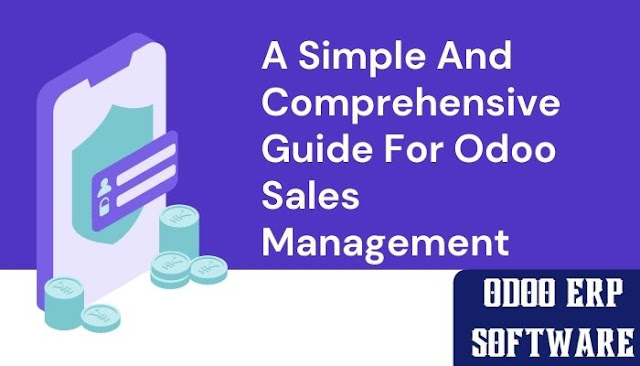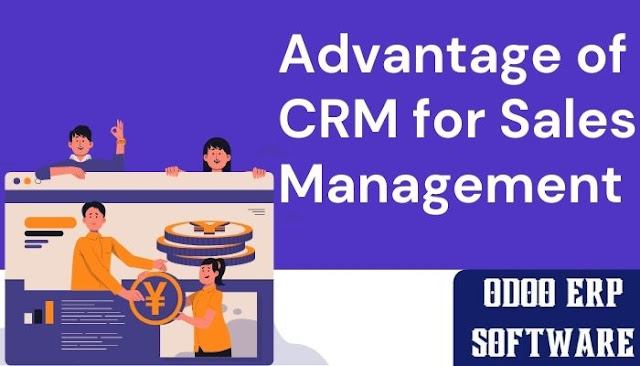The Odoo Open ERP's Sales Management module is among the most notable modules, mainly responsible for the actual execution of sales tactics and assisting in the administration of all sales-related operations. The program gives you an insight into how to effectively manage your sales team. You may easily generate sales orders from qualified chances with the help of this practical deployment.
On a single dashboard, Odoo sales management software may display the whole sales department operations. Users can sell things more efficiently and professionally using this management system. Furthermore, it will simplify your high-risk sales duties and operations. As a result, you'll be able to save time. Employees will have more time to efficiently manage a greater number of activities without becoming frustrated.
Other Odoo modules, such as CRM, Inventory, and Accounting, can be simply connected with the Sales module.
Odoo ERP implementation for sales optimization
Businesses are up against intense battles in the industry to outperform their rivals. To keep ahead of the competition, a company must be able to understand every entrepreneurial initiative properly and effectively. The introduction of ERP software has eased business management. It has eliminated data management redundancy by automating time-consuming entries. Stakeholders and employees now have more time to concentrate on other aspects of the business. However, ERP has limits when it comes to merging various company processes.
There are several departments in an organization like Customer Relationship Management (CRM), Human Resource Management(HRMS), Warehouse, Inventory, Finance, etc. However, different software was installed in each department to fulfill a certain set of tasks for communication. The disadvantage was that no contract existed between the various departments, resulting in data and resource loss.
ERP systems are required for businesses with a large staff to optimize processes. With ERP solutions, businesses may decrease IT expenses, enhance efficiency, enhance customer service, plan more effectively, strengthen data security, and assure compliance requirements. ERP solutions, on the other hand, are only useful if they can break down functional silos and provide transparency across the corporation.
Benefits of Odoo ERP implementation for the organization
Availability:
Odoo has over 5000 modules, which organizations may put in to meet their individual need.
Single Software Application:
Odoo is an open-source ERP system that can handle all of your business needs. CRM, HRM, inventory, manufacturing, and accounting are among the modules included. Odoo's app store contains over 10,000 apps that cater to the demands of a variety of sectors.
Easy implementation and integration:
Odoo is API-friendly, so it's simple to combine with several other enterprise applications and apps. Business procedures and data consistency are difficulties that plague many ERP systems. Odoo connects with various platforms to enhance the functionality of corporate processes. Odoo features a modular framework (sales, inventory, accounting, and warehouse), allowing for staged implementation. Organizations can test the functioning of each module by implementing it one at a time.
No Licensing cost:
Licensing expenses for top ERP systems are high, but with Odoo development, these costs may be avoided. Because Odoo is open-source, there are no license fees associated with its use. For ERP development projects, the source code is readily available. Businesses can use the money they save on future customizations because there are no licensing fees.
Integrated Application
In Odoo, integration is crucial. It is an essential capability in the Odoo environment for integrating numerous applications to build an integrated working capacity and improve efficiency. One of the advantages of the Odoo system that distinguishes it from other ERP systems is its ability to integrate. The Odoo system's sales module is tightly connected with the rest of the system to give you a seamless working experience. Data administration is made easier by integrating the Odoo sales module. In the sales module, all of the data from the other modules will be automatically updated. The following are some of the highly integrated apps with the sales module.
Customer Relationship Management (CRM):
The Odoo CRM module cooperates with the Sales module to provide your sales staff with up-to-date statistics on clients and leads. Integration with the sales module will give your sales staff direct access to leads and the ability to communicate with them using the sales module's live chat function.
Accounting:
All of the invoicing requirements for the sales module will be handled by the accounting module. Based on sales orders, delivery orders, and contracts, the accounting module can produce bills automatically.
Inventory:
Your sales team can get a direct view of the products thanks to the inventory module. So according to customer requests, the sales team can check product availability. The inventory module helps to check delivery status and requests.
eCommerce:
Users may establish and run a fully integrated online store for selling their products directly with the help of the Odoo eCommerce module.
Many of the functionalities in the Odoo sales module are designed to help salespeople work more efficiently. Users can get the most application regarding sales management with the advanced support of the tools and functions of the sales module combined with the integrated modules of the ERP system.
Advantage of CRM for sales management
CRM installation is known to provide significant Sales Management CRM benefits for all elements of your organization. With the ability to unify all of your customer service, advertising, and sales needs on one platform, it goes without saying that CRM is an extremely beneficial tool for your business. But, exactly how may this instrument be used to maximize the benefits that can be gained from it? A CRM may be used in a variety of ways to enhance every element of your business, and sales are only one of them.Sales Management CRM for sales representative
Lead Management:
The Leads Module in CRM allows sales representatives to automatically acquire leads from a variety of sources and segment them based on criteria such as statistics, buying behavior, preferences, and interests. Salespeople can optimize the sales process by personalizing their reaction to each unique lead by collecting vital insights from the advertising division.
Activity Management:
Sales reps' lives are made easier by the exercise administration feature, which keeps track of all their actions, both completed and planned. CRM's performance decreases the risk of missing out on an opportunity. It keeps track of all scheduled meetings, calls, tasks, and so on, and provides a holistic perspective so that nothing is overlooked. You may also use CRM and Telephony connectivity to make calls quickly and provide excellent customer service. Salespeople can also prioritize their tasks and receive notifications if a job with a similar name or assembly is due.
Centralized Data:
Before beginning a sales call, sales personnel may have all pertinent information about the customer at their fingers. The basis on previous call history, the sales representatives will understand whoever the client is and what item they're engaged in. This will cut the call time in half and allow the representative to provide more personalized service to the client.
Sales Forecasting:
A CRM will provide a management framework with actual statistics that can be examined to improve the group's performance. Managers can create techniques to retain clients and augment sales by monitoring data units related to name quantity, case times, up-sell charges, income per call, and so on.
Sales and Marketing:
A customer expects nothing less than the best. Both the sales and marketing divisions must work together to build excellent customer connections. With CRM, marketing and sales departments may now stay current by accessing real-time information about a customer's profile. Marketing automation features in CRM allow the marketing team to provide results to the sales team without having to do so manually. The sales staff can then take action on these leads and try to close them.
Final Thoughts
One of the most important applications in the Odoo ERP is the sales module. With its comprehensive capabilities and features, this program may assist your company in effectively managing all sophisticated sales activities.






